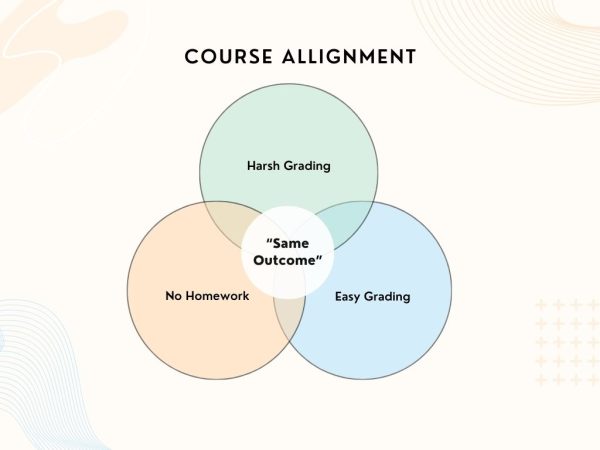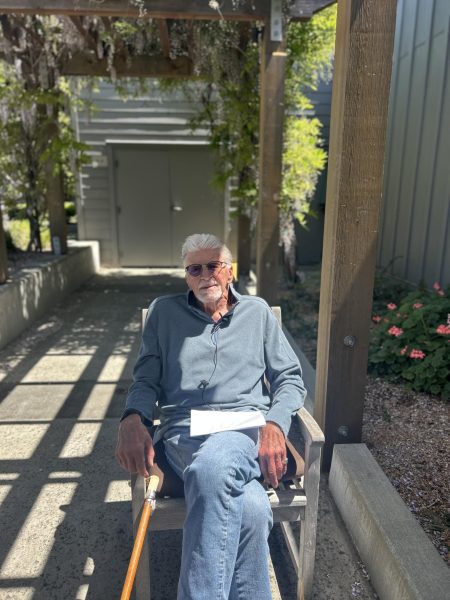ROTC: The rewarding road less traveled
June 5, 2023
“[During field training exercises, the Army] ships us off two hours away to Michigan. ….You’re eating MREs (Meals, Ready-to-Eat), which is nasty military food, you’re in the same clothes every day, you don’t have a bathroom and you’re just running terrains. …. It’s absolutely pouring — there’s hail and snow,” Alex Odland, Redwood alumna and current Notre Dame Army Reserve Officers’ Training Corps (ROTC) Cadet, said.

For many, this would be torture, but for others, including several Redwood graduates, it is a prime leadership training experience. ROTC is a program training college students to become military officers in the branch they choose (eg. Army, Navy, Air Force, Marines). The program consists of military-based courses and training that prepare students mentally, physically and emotionally to serve as an officer in the U.S. military.
![]()
Every year, Redwood hosts representatives from each branch of the military to come speak to students about ROTC, according to College and Career Center Specialist Becky Bjursten.
“I know students that are currently [at Redwood] that have applied for ROTC scholarships, which is usually a full scholarship and a commitment to serve afterward, but you can also be involved in an ROTC program on your campus without a scholarship, and that is sometimes an avenue to later get a scholarship if you decide you want to serve,” Bjursten said.
In addition to the scholarships provided by the ROTC program, many students choose to take this route instead of attending a traditional military academy, such as the United States Military Academy at West Point. Armando Hisquierdo is a sophomore at Diablo Valley College and has been partaking as a cadet in the University of California (UC), Berkeley ROTC program while in community college. Hisquierdo has been accepted to transfer to UC Berkeley for his junior year. Hisquierdo explained that the main benefit of being part of the ROTC program involves a balance between training and a typical college lifestyle.
“You go to West Point, [and it] is pretty much nothing but the Army or whatever branch you join; whereas [in] ROTC, you’re going to school [at] whatever four-year [college] you want to go to. But, you’re also doing military [training], so you can live the best of both worlds,” Hisquierdo said. “You [also] meet different people that aren’t necessarily rich or have the connections to get into a prestigious school like West Point or the Naval Academy. Everyone is able to join through any background, so [it offers] a more diverse group of people.”
The multitude of benefits that ROTC offers has attracted numerous Redwood students throughout the years, including senior Rowe Stodolnic. After attending a summer program at West Point, Stodolnic learned about ROTC as an alternate path.
“[With] ROTC, I can still go to whatever college I want to go to and take the classes I want to, have a good social life, but still have the military aspect,” Stodolnic said.
Stodolnic will be partaking in Army ROTC at Brown University starting in the fall of 2023. Stodolnic is motivated to take advantage of ROTC as an intense undergraduate leadership education that he hopes will culminate into a four- or five-year career in the Army as an officer in his first choice branch: Infantry, the Army’s boots on the ground during combat.

“I think it will be a big chapter where I just learn a lot, and there will be a lot of character building,” Stodolnic said.
In addition to the extensive leadership training, Stodolnic looks forward to the additional opportunities within ROTC, such as unique summer courses and training experiences.
“You [obtain] a lot of leadership skill training and social training, but also I’m looking forward to a lot of the physical training [such as] summer training, [which includes airborne] school, where you’re jumping out of planes. There’s also water and dive training,” Stodolnic said.
Many Redwood alumni share the same views as Stodolnic regarding the unique education and experience ROTC provides. Redwood graduate Jimmy Phelan is a current freshman and ROTC student at Brown University, the same path that Stodolnic will be taking following graduation. Phelan reflected on his past year as a cadet and explained that while ROTC is a lot of work, the end result is extremely rewarding in a variety of ways.
“The best part about [this program] is that once we finish [training], we all go to breakfast together. [It’s] always nice because you [feel like] you got something done before everyone else is up, and you feel good about yourself. It’s a dopamine rush,” Phelan said.
Also a Redwood alum and freshman cadet, Alex Odland’s training in the Notre Dame ROTC has led her to acquire an understanding of what it takes to be in the Army and thus has developed an immense appreciation for those who work in the military field.
“The respect that you gain for officers [and] for people that dedicate their lives to this is absolutely crazy. These people are loyal and do this service out of selflessness. Some of it is really difficult, and people devote their lives to it. I have gained a huge respect for people in this type of work and have a huge admiration for them,” Odland said.
Odland has immersed herself in the program through several on-campus clubs associated with ROTC including Irish Iron, an Army ROTC lifting club. Additionally, Odland has learned important life habits through ROTC’s intense expectations.
“Time management is a huge thing in this program. Notre Dame doesn’t [care] if you’re an athlete, if you’re in ROTC, if you’re doing 80 different clubs; academics is something they expect you to manage at the same level as anyone else that’s not doing anything. … I’m more productive because I’m getting up super early and training with the Army and then doing all [of] my other [commitments]. I’ve become a huge advocate for routines and the ways in which you dedicate your time, and I couldn’t have done that without [ROTC] forcing me to wake up at five in the morning,” Odland said.

While ROTC can be demanding, Odland cherishes the memories she has made with her battalion and the support the cadets offer each other throughout their training. Odland especially looks back on her field training exercises with pride in her battalion, explaining that Notre Dame ROTC carries out their field training exercises in Michigan, typically in frigid conditions. Each cadet is given a ruck containing everything they would need to survive for a few days out in the field.
“Essentially, you’re simulating what it would be like to be on active duty in the Army in any given area. … Everyone was just so excited to be there and crack jokes, and each MRE has a dessert so people were ripping open their MRE’s and trading their desserts. If you get Skittles or M&Ms, it’s a huge deal,” Odland said.
Odland found joy in her battalion’s determination and positive attitude throughout the field training exercises, revealing the inspiring people that the ROTC programs attract.
“I think what’s really cool about the people that do these kinds of programs is their perspective on [the work they do]. Where [the average person] might be like, ‘Oh, this is so shitty, it’s raining, it’s cold, I’m freezing, I don’t want to be here,’ they’re just happy to be there and happy to be [together]; I’ve always really liked that about the program,” Odland said.























